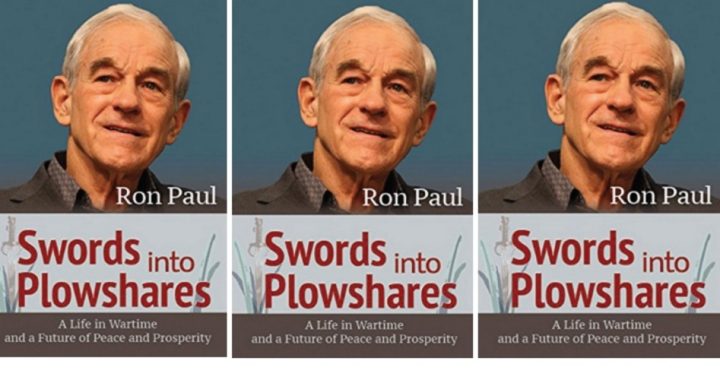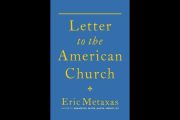
Swords into Plowshares: A Life in Wartime and a Future of Peace and Prosperity, by Ron Paul, Ron Paul Institute for Peace and Prosperity, 2015, 237 pages, paperback.
Former Republican member of Congress and three-time presidential candidate Ron Paul needs no introduction. A medical doctor by training, Dr. Paul was known in Congress as “Dr. No” for his steadfast opposition to unconstitutional legislation. He was regularly labeled the “taxpayer’s best friend.” But he is perhaps best known around the world as an advocate for a U.S. foreign policy of peace, neutrality, and non-intervention.
Having read, I believe, all of Ron Paul’s books, I can say without any hesitation that Swords into Plowshares is undoubtedly his most important and most personal book.
The book has no preface or introduction, but the first chapter serves as one. There are 21 chapters, each opening with an excerpt from a song that relates to war or peace. The chapters vary greatly in size (Three are 20 or more pages, three are four or fewer pages, and the rest range from six to 15 pages.) and scope (war, peace, foreign policy, economics, dictators, empire, trade, veterans, government, nonintervention). The book is very easy to read and digest, as the majority of the chapters are divided into between two and 10 sections, depending on the chapter’s length. There is no index, but all of the chapter sections are listed in the very detailed table of contents. Swords into Plowshares closes with a list of the songs excerpted in the book, a list of other songs of interest, and a list of books mentioned in the book. Because of the nature of the book, there are no footnotes. Each chapter reads like Paul giving one of his many impromptu, but informative and passionate, speeches. The title of the book is taken from Isaiah 2:4.
It is in the first and third chapters that we see at last why it is that Paul is so adamantly opposed to war and interventionism and in favor of peace and a noninterventionist foreign policy.
Born before World War II, Paul remembers the government rationing, the black markets (which he terms the “free markets”), the constant news about the war, and several of his uncles, cousins, and members of his church being drafted — and some of whom were killed in action. His family was “mainly of German descent,” and some relatives still lived in Germany during the war. Paul observes that as a child he was taught to pray for their safety, “yet it was the US military that was trying to kill them.” Even at a young age, “families fighting and killing each other made no sense” to him. When World War II ended, the 10-year-old Paul “was quite certain that war should be avoided if at all possible.” He “dreaded the possibility of taking up arms and killing people.”
While in college, because he assumed that he would one day be drafted, Paul decided to go to medical school so that he could be in a position to save lives instead of take lives. While in college, he “never heard any discussion of the pros and cons of going to war” or heard addressed “the subject of noninterventionist foreign policy that the Founders had advocated.” While serving as an Air Force flight surgeon during the 1960s, Paul “had strong suspicions at the time that the war was wrong,” but “did not yet fully understand the great evil of our policy of endless, undeclared wars.” Yet, he now asks about his time in the Air Force: “Why was I so complacent, and why did I so rarely seriously question the wisdom of the Vietnam War?” It was knowledge of people who died in the Vietnam War “in combination with a growing understanding of how and why most wars are fought” that played a significant role in building Paul’s “determination to advocate for a noninterventionist foreign policy.”
Paul was elected to Congress for the first time in 1976. Although he was “strongly opposed to intervention in the affairs of other nations,” foreign policy was not on the “front burner.” It was economic and monetary policy that prompted him to run for Congress. Over the years he “became much more firmly convinced that the policies of foreign intervention, endorsed by both political parties, would always cause a great deal of harm to us” and “continued to strengthen his belief that a noninterventionist foreign policy is a necessity for a free society to exist and thrive.” Each year his conviction “grew that most of our wars throughout our history should have been avoided.” Paul spoke out against President Reagan after 241 U.S. servicemen were killed in Beirut, Lebanon, in 1983. Reagan’s interventions “stirred” his “interest in foreign affairs.” Over the years his “abhorrence of our involvement in foreign militarism” grew as he “continued to read and study many both liberal and libertarian authors” who convinced him “of the antiwar cause and the benefits of minding our own business.” It was “experience and exposure to pro-peace journalists and authors” that helped strengthen his “opposition to the status quo foreign policy of the Democrats and Republicans.”
Paul modestly tells the reader that Swords into Plowshares “is about the needlessness of war and whose interests are served by war.” This is quite an understatement. The book is a tour de force regarding all things related to war, militarism, the warfare state, and U.S. foreign policy.
“War is unholy and makes no sense,” maintains Paul. “The bad results of war are endless.” One of the most significant reasons wars erupt is because “war-prone individuals, bent on evil” are allowed to gain power in government. War is the “health of the state” and “always an economic negative.” War “distracts from wealth creation, consumes wealth, and undermines liberty.”
Yet, “the arguments against warfare fall on deaf ears with most conservatives.”
This, of course, does not mean that Paul is a pacifist. He does not oppose truly defensive war. The trouble is that “war is rarely justified, i.e., defensive in nature.” Although most wars “are justified through deceptions,” only a country responding to an attack by another nation is engaging in a just war. And in the United States, “engaging in war should require a congressional declaration.”
Paul doesn’t shy away from critiquing World War II, the “good war.” “War is hell; there are no good wars,” he says. He equally condemns the atomic bombing of Hiroshima and Nagasaki and the firebombing of Dresden and Hamburg. He talks about how FDR maneuvered the nation into war, just as President Wilson did for World War I. He destroys the argument that the United States entering World War II ended the Depression and the “deeply flawed arguments for why war is healthy for the economy.” Paul is not alone, of course, in his criticisms of the “good war.” He favorably refers to conservative Patrick Buchanan’s book about World War II: Churchill, Hitler, and the Unnecessary War.
Naturally, the Korean War, the Vietnam War, the wars in Iraq and Afghanistan, and the military interventions of various presidents since World War II are also strongly condemned. Paul sees wartime presidents as the worst violators of liberty. He heavily criticizes President George W. Bush, whose “Bush Doctrine” is “an American-style ‘enabling act,’ giving dictatorial powers to any sitting president.”
There is plenty in Swords into Plowshares to make neoconservatives squirm (and some conservatives uncomfortable). Paul discusses and condemns the military-industrial complex, the Federal Reserve, the public school system, sanctions, false flag incidents, NATO, entangling alliances, drone attacks and drone operators, the PATRIOT Act, preemptive war, assassinations without due process, government bureaucrats, the nationalization and militarization of local police, the NSA, secret military prisons, extraordinary rendition, and torture.
The United States’ “militaristic foreign policy,” Paul contends, is “immoral.” It “hurts our national security, profits special interests, and costs too much.” It “causes greater hatred toward and blowback on the American people.” “Blowback” is a theme that Paul raises throughout the book. Although Americans may not be counting “the deaths of non-Americans as a consequence of our sanctions, invasions, and bombings,” the Muslim world is, and “recipients of such violence and their families have long memories.” U.S. foreign policy is also hypocritical, since “the US spies, bombs, and occupies and then turns around and condemns others for doing the very same thing.” Swiss neutrality is held up as a model for U.S. foreign policy. The United States should simply bring its troops home and mind its own business.
Yet, governments are determined to dehumanize the enemy to condition “soldiers to kill their fellow human beings.” Governments issue propaganda and disinformation and utter “official lies” to scare the populace into supporting its wars. Governments “lie and use war propaganda to incite enough hatred to cause young soldiers to accept traveling many miles to kill strangers who never committed an act of aggression against them or their country.” What the government wants is “efficient, sterile killers in immoral wars who can be awarded medals and paraded before cheering audiences as great patriotic defenders of our liberty.”
Paul says we must “reject the notion that loyal obedience to state dictatorial power is patriotic, necessary, and always good.” Americans must soundly reject “the concept that a government can legitimately initiate force and commit aggression against anyone or another country.” The government “has little to do with defending our freedoms or stopping terrorism.” “Service” in the U.S. military — to invade, occupy, and oppress countries in order to extend U.S. empire — must not be glorified as a “heroic” and “sacred effort.” It annoys Paul to no end when a “chickenhawk” thanks him for his service as if he were “some sort of hero.” “Merely wearing a military uniform doesn’t qualify anyone as a hero,” he adds.
Swords into Plowshares is the best introduction to the destructiveness and immorality of war and a Jeffersonian foreign policy of peace, commerce, honest friendship with all nations, and entangling alliances with none.



